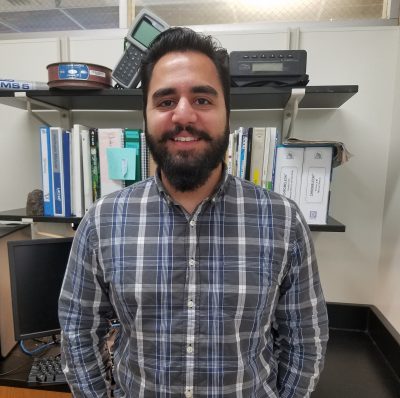By Shahan Haq
This blog is part of Students in Community Science, a series of Thriving Earth Exchange articles featuring students who have had internship, educational or volunteer experiences in community science

During an atmospheric chemistry course I took a few years ago, the professor would pause his lecture before major discoveries in the field and wave his hands enthusiastically to alert us of an upcoming aha moment. These are brief, powerful moments of insight that can change the trajectory of your thought – moments when the dots connect. My internship with the Thriving Earth Exchange was filled with aha moments.
At Thriving Earth Exchange, I helped launch an initiative, Adaptation Analytics, focused on using design-thinking methods to bridge information gaps between climate science and society to advance resilience to climate change. There was an information need, and we were figuring out how to fill the gap with data.
As a part of this work, I studied decision makers to understand their decisions and data needs. I then categorized geoscience datasets and web tools based on their spatial coverage and their relationship to key government sectors. Next, I took a deep plunge into ways new risk visualizations could supplement their decision-making processes. My work culminated in proposals to impact-fund and venture foundations, and in a new understanding of how decision makers interact with science, data and visualizations.
The most memorable part of the internship was presenting on the project evolution at the National Council of Science and the Environment annual conference, where I was also able to assist with a Thriving Earth Exchange project launch workshop. It was enthralling to experience the capacity of people (some of whom trained as scientists) working on climate sustainability issues from different angles outside of research science. Not just at the conference, but throughout my entire internship I was surprised at how receptive people are to scientific evidence and how eager they are for usable information.
The most important lessons I learned from the internship were to listen to and have empathy with the end-user of any product, and to be inclusive in science by making it accessible to and usable for the broader community. I immediately incorporated these lessons into my research on urban ecohydrology. This past spring, I decided to attend a water quality practitioner conference instead of a science conference, and I presented my research (with a focus on relevant data collection efforts) to watershed managers and local regulators at the Virginia Water Monitoring Council annual conference. A few months later, my advisor and I invited the practitioners to present on environmental strategies and participate in the dialogue in our session on salinization at this year’s AGU Fall Meeting – and to our surprise, we received two abstracts from them!
 Since my internship with Thriving Earth Exchange, I’ve been working on writing my Master’s (in geology) thesis and preparing manuscripts for publication. I’m also pursuing career opportunities in the climate risk modeling field – a field that I didn’t even know existed before my internship and in which I can apply my geoscience background. The Adaptation Analytics team and I have also been organizing a session at this year’s AGU Fall Meeting based on our work, titled Science to Action: Meeting the Information Needs for Climate Change Adaptation Decisions. If you’ll be at the meeting, please stop by and say hello!
Since my internship with Thriving Earth Exchange, I’ve been working on writing my Master’s (in geology) thesis and preparing manuscripts for publication. I’m also pursuing career opportunities in the climate risk modeling field – a field that I didn’t even know existed before my internship and in which I can apply my geoscience background. The Adaptation Analytics team and I have also been organizing a session at this year’s AGU Fall Meeting based on our work, titled Science to Action: Meeting the Information Needs for Climate Change Adaptation Decisions. If you’ll be at the meeting, please stop by and say hello!
I urge all graduate students to get involved in community science efforts and to use their deep (at times, painstakingly deep) familiarity with the scientific method and process-based thinking to advance community priorities. You may be surprised by how much impact you could make, and you certainly will be surprised by how much the journey could impact you by introducing you to new research questions, career pathways, communication skills and aha moments. Involvement in community science not only makes you a better scientist and advances the common good, but it also aligns you with decision makers to promote evidence-driven decisions – a step vital to addressing the momentous climate challenges our generation will face. Plus, to borrow a metaphor from hydrology, if we as researchers are just tiny ephemeral streams flowing into a vast ocean, we might as well nourish a few gardens along the way.
